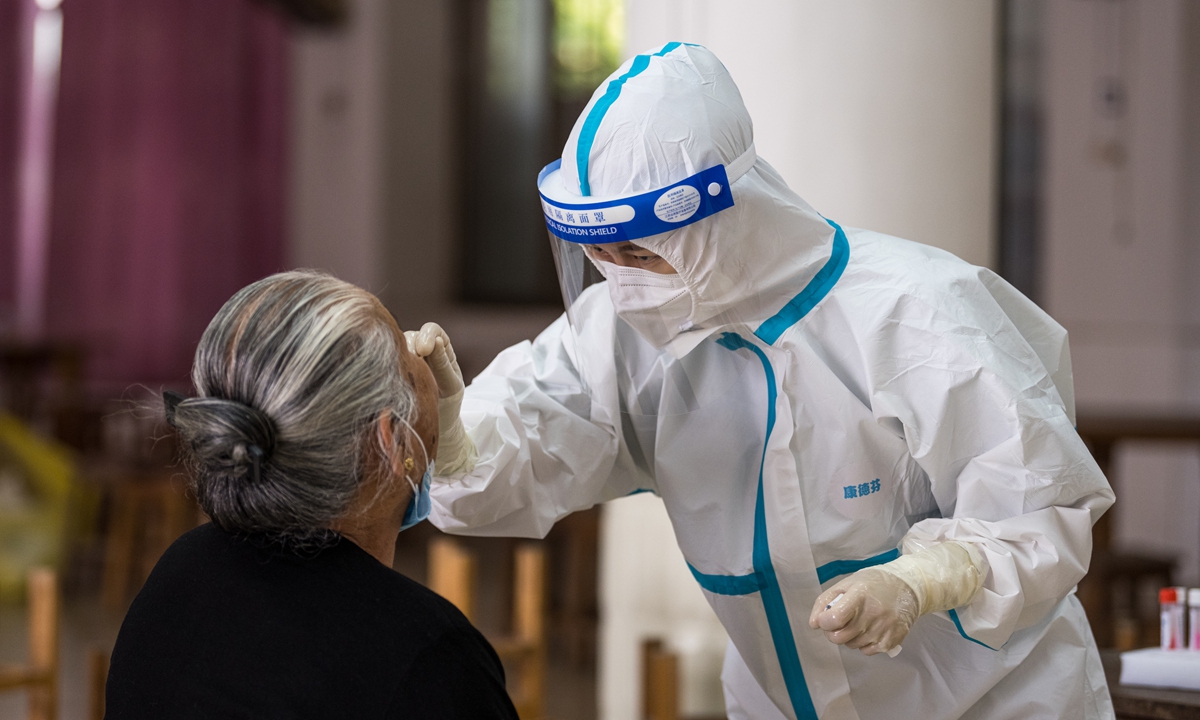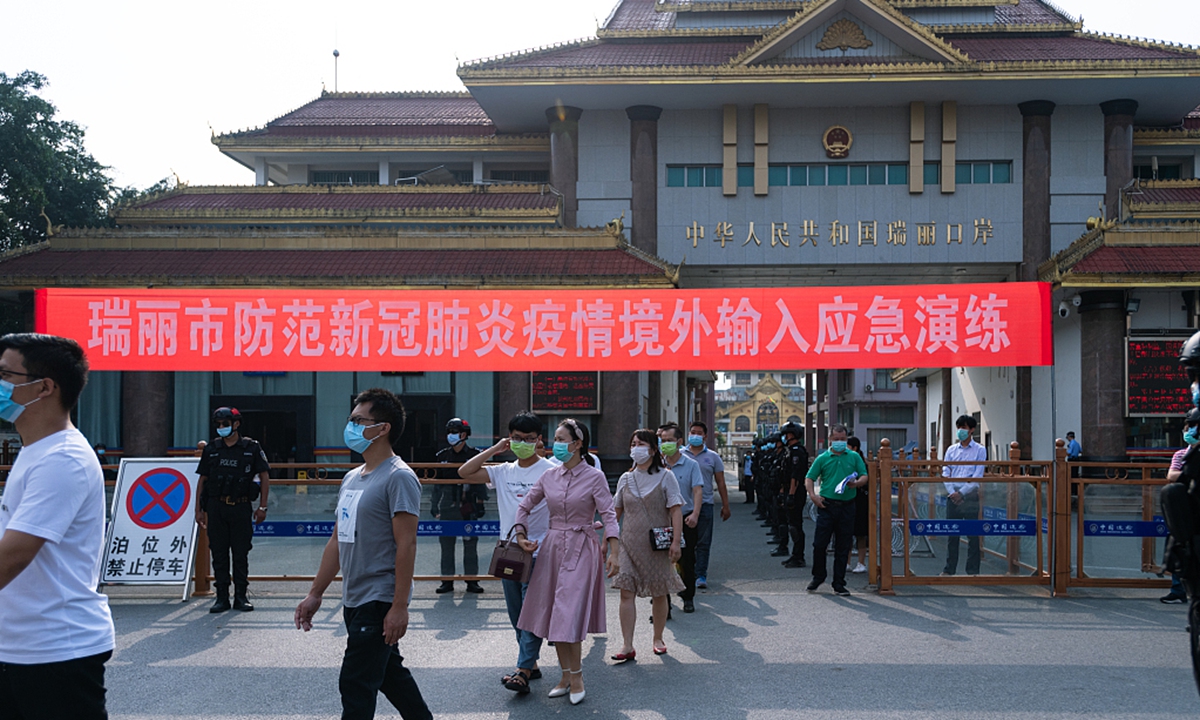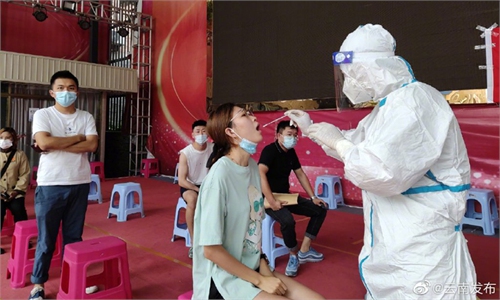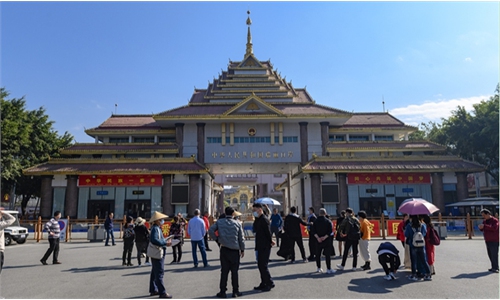Ruili subsidizes residents and businesses affected by strict epidemic control, sets no-resident buffer zone at Myanmar border

A resident receives COVID-19 nucleic acid test in Ruili, Southwest China's Yunnan Province on October 29, 2021. The city which shares a border with Myanmar has been testing residents daily this week. Photo: VCG
The city of Ruili in Southwest China's Yunnan Province, which shares a long border with Myanmar and has been under tight COVID-19 controls due to pressure from imported cases, has implemented measures to subsidize local residents and businesses and help them through economic difficulties, city authorities told a press conference on Friday.
On Thursday, an article by former deputy mayor of Ruili, Dai Rongli, went viral, which calls for national attention and support for the border city. Businesses should be resumed while medical aid and supplies are needed, he wrote.
Some netizens mistook Dai as the current deputy mayor and thought the situation in Ruili must be so severe that he had to call on the public. But Dai later clarified that he had left Ruili for a while.
But Dai's article reflected the public's concerns, which Ruili authorities quickly responded to in the Friday press conference.
Ruili is at the forefront of containing imported COVID-19 cases, and has frequently adopted strict control measures.
Ruili has set a 50 to 200 meter-wide buffer zone along the border line amid pressure of imported cases and illegal border crossings. Residents in the region have been relocated and each person can receive 600 yuan ($94) in subsidy a month, according to the Friday press conference.
The city has reported 19 local COVID-19 infections since October 1, and among returnees from overseas, more than 20 percent have tested positive for COVID-19, indicating the severe epidemic control situation.
Frontline epidemic control personnel, including border police and medical staff, have been working overtime under high pressure to guarantee Ruili will not be a loophole of the nation's hard-won epidemic control results. Since the COVID-19 epidemic, 41 police and auxiliary police officers in Yunnan have sacrificed their lives in the control work, authorities revealed in September.

A drill on preventing imported COVID-9 cases exercised in Ruili File Photo: CFP
With tight control measures implemented since the March resurgence, which showed no sign of fundamental change, many businesses have closed, dealing a blow to people's livelihood.
The city has distributed 1,000 yuan in one-time subsidies to each member of border village families, households with disabled or severely ill people, people on the brink of poverty, and laid-off workers. The policy has benefited 68,780 people.
The local government has also allocated 23,000 sets of living necessities, including rice, noodles, oil and vegetables, and 3 million yuan in consumption coupons to residents.
More than 3,000 business owners have received 20 million yuan in rental reductions. The bank has postponed loan deadlines for 68 companies.
Ruili normally has 500,000 residents and its primary industry is the jade trade with Myanmar and business related to it. Since the COVID-19 pandemic, international trade has been cut and many people have left the city, the Global Times learned from local residents.
People who are not covered by the subsidies have been living on savings, which created economic difficulties and a strong sense of anxiety, the Global Times learned.
To avoid the spread beyond Ruili, local authorities have imposed tight regulations on people leaving the city. People who want to leave other than for medical reasons, public service or family deaths must go through a seven-day self-sponsored quarantine.
Many Ruili parents also worried that schools have not resumed and their children only receive lectures and instructions on homework on WeChat or other video tools. The quality is incomparable to in-person classes.
Graduating students in junior and senior high school have resumed classes under strict management. To achieve this goal, schools earlier adapted teacher dormitories and turned multi-function rooms into student dormitories.
Ruili authorities vowed to resume in-person classes for other grades that meet the requirements starting November 5. For those who cannot do so, classes will resume in different batches after the city passes an incubation period without new epidemic cases.
Amid public complaints on conditions of the quarantine venues, Ruili authorities have set up six hot lines to respond to their needs and solve problems.
Yunnan provincial authorities on Thursday met on epidemic control work, requiring strict implementation of epidemic control methods to prevent land port transmissions, regulate tourism and public gatherings, and accelerate vaccination for children.


